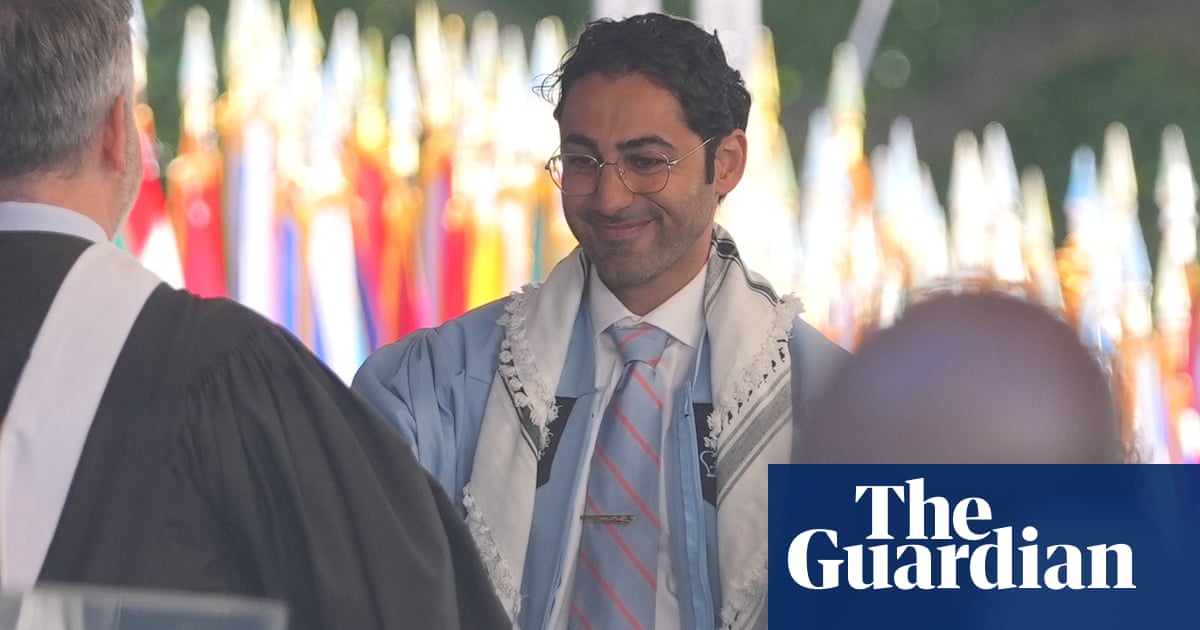Columbia University student Mohsen Mahdawi, released just over two weeks ago from federal detention, crossed the graduation stage on Monday to cheers from his fellow graduates.
The Palestinian activist wasarrested by immigration authoritiesin Colchester, Vermont, while attending a naturalization interview. He was detained and ordered to be deported by the Trump administration on 14 April despite not being charged with a crime.
Several students cheered for Mahdawi, 34, who was draped in a keffiyeh as he walked across the stage. He blew a kiss and bowed, one videoshowed. Then he joined a vigil just outside Columbia’s gates, raising a photograph of his classmateMahmoud Khalil, who remains in federal custody.
“It’s very mixed emotions,” Mahdawi told the Associated Press. “TheTrump administrationwanted to rob me of this opportunity. They wanted me to be in a prison, in prison clothes, to not have education and to not have joy or celebration.”
He is one of several international students who have been detained in recent months for their advocacy on behalf of Palestinians.
TheTrump administrationis attempting to deport them using an obscure statute that gives the secretary of state the right to revoke the legal status of people in the country deemed a threat to foreign policy.
Mahdawi wasreleased two weeks laterby a judge, who likened the government’s actions to McCarthyist repression. Federal officials have not accused Mahdawi of committing a crime, but argued that he and other student activists should be deported for beliefs that may undermine US foreign policy.
For Mahdawi, who earned a bachelor’s degree in philosophy from Columbia’s School of General Studies, the graduation marked a bittersweet return to a university that he says has betrayed him and other students.
“The senior administration is selling the soul of this university to the Trump administration, participating in the destruction and the degradation of our democracy,” Mahdawi said.
Sign up toThis Week in Trumpland
A deep dive into the policies, controversies and oddities surrounding the Trump administration
after newsletter promotion
He pointed to Columbia’s decision to acquiesce to the Trump administration’s demands – including placing its Middle Eastern studies department under new leadership – as well as its failure to speak out against his and Khalil’s arrest.
Khalil would have received his diploma from a Columbia master’s program in international studies later this week. He remains jailed in Louisiana as he awaits a decision from a federal judge about his possible release.
As he prepares for a lengthy legal battle, Mahdawi faces his own uncertain future. He was previously admitted to a master’s degree program at Columbia, where he planned to study “peacekeeping and conflict resolution” in the fall. But he is reconsidering his options after learning this month that he would not receive financial aid.
For now, he said, he would continue to advocate for the Palestinian cause, buoyed by the support he says he has received from the larger Columbia community.
“When I went on the stage, the message was very clear and loud: they are cheering up for the idea of justice, for the idea of peace, for the idea of equality, for the idea of humanity, and nothing will stop us from continuing to do that. Not the Trump administration nor Columbia University,” he said.
